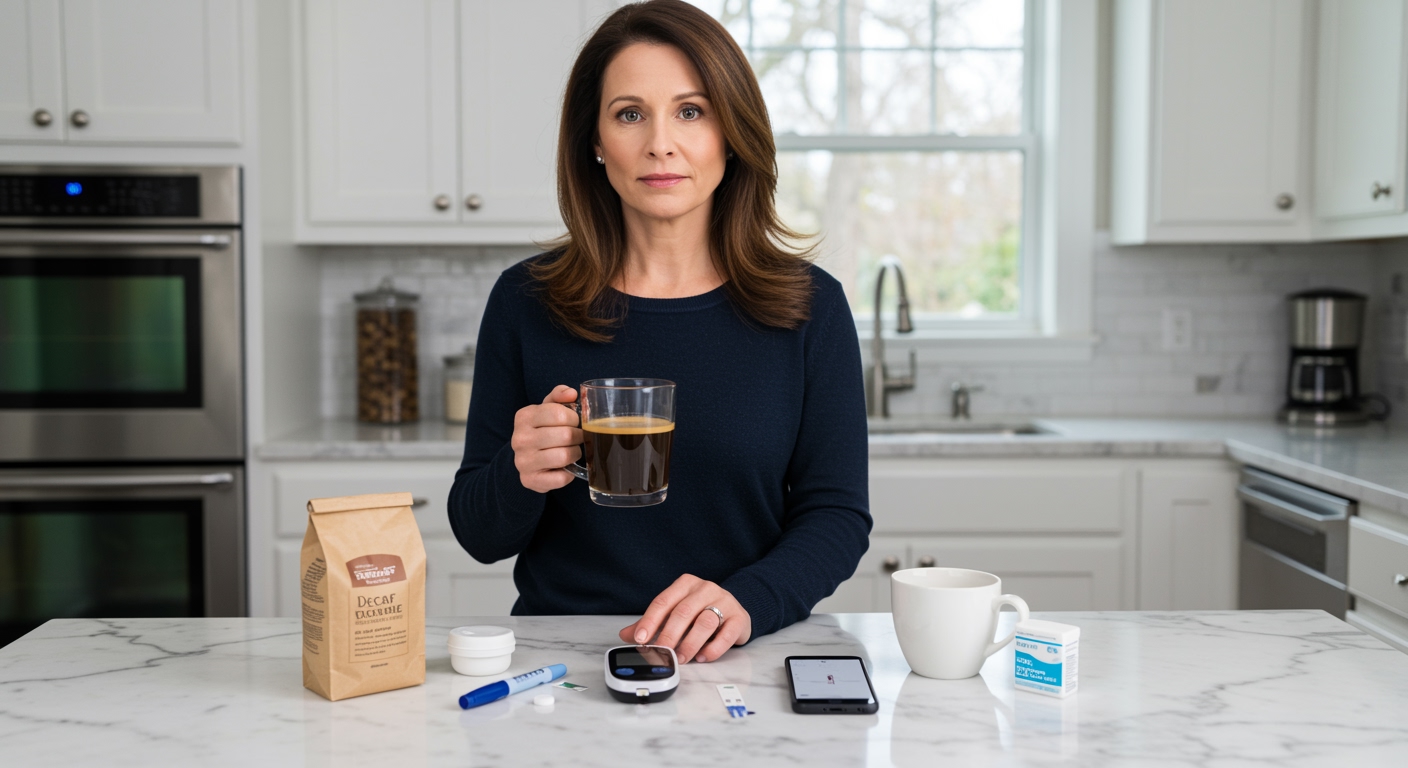✪ Key Takeaway: Decaf coffee is generally safe for diabetics and may even help improve insulin sensitivity when consumed without added sugars.
Introduction
You reach for that warm cup of decaf coffee every morning, thinking you made the smart choice for your diabetes.
Many people with diabetes switch to decaf coffee because they worry about caffeine affecting their blood sugar levels.
Hi, I’m Abdur, your nutrition coach and today I’m going to explain exactly how decaf coffee affects your blood sugar and whether it’s truly safe for diabetes management.
What Happens When You Drink Decaf Coffee?
Decaf coffee contains less than 3% of the original caffeine content found in regular coffee.
The decaffeination process removes most caffeine but keeps important compounds called chlorogenic acids.
These chlorogenic acids are powerful antioxidants that can actually help your body process glucose more effectively.
When you drink decaf coffee, your body still gets these beneficial compounds without the blood sugar spikes that caffeine might cause.
Research shows that people who drink decaf coffee regularly have better insulin sensitivity compared to those who avoid coffee completely.
✪ Fact: Decaf coffee still contains over 1000 bioactive compounds that support metabolic health.
Does Decaf Coffee Raise Blood Sugar Levels?
Pure decaf coffee without any additions has virtually zero carbohydrates and calories.
This means it should not cause any direct increase in your blood glucose levels.
However, the way you prepare your decaf coffee makes all the difference in blood sugar impact.
Adding sugar, flavored syrups, or high-carb creamers will definitely spike your blood sugar regardless of the coffee type.
Some people experience a slight blood sugar rise from decaf coffee due to the dawn phenomenon or stress response.
This response varies greatly between individuals and usually becomes less noticeable with regular consumption.
✪ Pro Tip: Test your blood sugar before and after drinking plain decaf coffee to understand your personal response.
Can Decaf Coffee Actually Help With Diabetes?
Multiple studies suggest that decaf coffee consumption may offer protective benefits against type 2 diabetes.
The chlorogenic acids in decaf coffee help slow down glucose absorption in your intestines.
This slower absorption means your blood sugar rises more gradually after meals when you drink decaf coffee.
Decaf coffee also contains magnesium and chromium, minerals that support healthy insulin function.
Regular decaf coffee drinkers show improved insulin sensitivity and better long-term blood sugar control.
The antioxidants in decaf coffee help reduce inflammation, which is a major factor in diabetes complications.
✪ Note: Studies show 3-4 cups of decaf coffee daily may reduce diabetes risk by up to 25%.
What About Decaf Coffee Additives and Blood Sugar?
The biggest blood sugar danger with decaf coffee comes from what you add to it.
Regular sugar, honey, and flavored syrups can turn your diabetes-friendly decaf into a blood sugar bomb.
Even artificial sweeteners may trigger insulin responses in some people with diabetes.
Whole milk and heavy cream add minimal carbs but can contribute to insulin resistance over time.
The safest approach is drinking your decaf coffee black or with small amounts of unsweetened plant milk.
If you need sweetness, try stevia or monk fruit sweetener in very small amounts.
✪ Pro Tip: Cinnamon powder adds natural sweetness to decaf coffee without affecting blood sugar levels.
How Much Decaf Coffee Is Safe For Diabetics?
Most diabetes experts agree that 3-4 cups of decaf coffee daily is safe for people with diabetes.
This amount provides maximum health benefits without any negative effects on blood sugar control.
Drinking decaf coffee with meals may help slow down the absorption of carbohydrates from your food.
However, avoid drinking large amounts late in the day as it may affect your sleep quality.
Poor sleep directly impacts blood sugar control and insulin sensitivity the next day.
Start with one cup daily and monitor your blood sugar response before increasing your decaf coffee intake.
✪ Fact: The optimal time to drink decaf coffee for blood sugar benefits is 30 minutes before meals.
The Bottom Line
Decaf coffee is not only safe for people with diabetes but may actually help improve blood sugar control when consumed properly.
The key to healthy living with diabetes is making informed choices based on science, not fear.
I would love to hear about your experience with decaf coffee and diabetes in the comments below, and please share any questions you might have about managing blood sugar through dietary choices.
References
At NutritionCrown, we use quality and credible sources to ensure our content is accurate and trustworthy. Below are the sources referenced in creating this article:
- PMC: Coffee consumption and risk of type 2 diabetes mellitus
- Diabetes Care: Caffeinated and Decaffeinated Coffee Consumption and Risk of Type 2 Diabetes
- JAMA Internal Medicine: Coffee, Decaffeinated Coffee, and Tea Consumption in Relation to Incident Type 2 Diabetes Mellitus
- Healthline: Is Decaf Coffee Bad for You?





